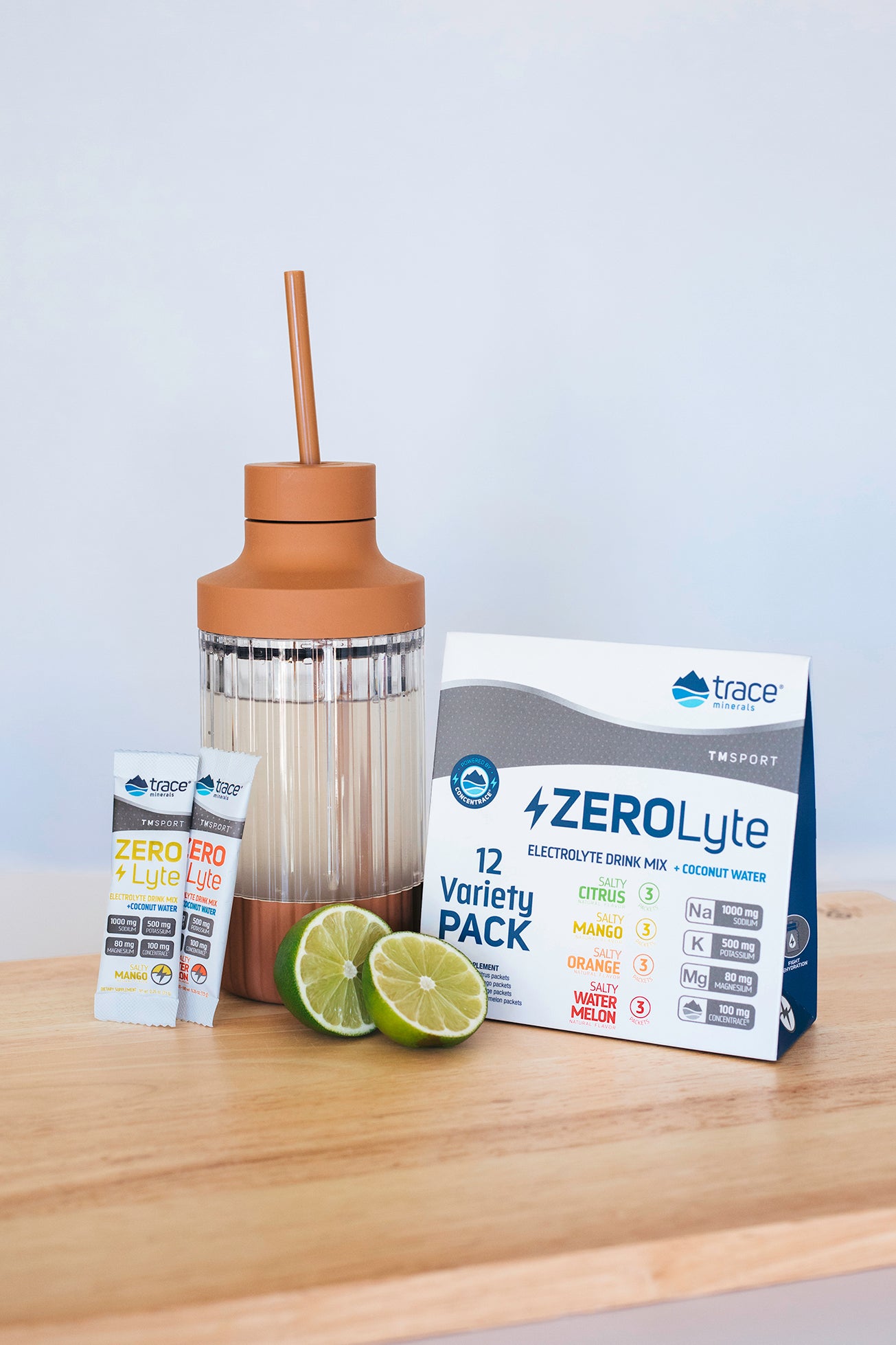At Trace Minerals, we understand the intricate balance and the critical need to provide the body with minerals that catalyze better nutrient absorption and utilization. By synergizing with the right mineral balance, our products help you achieve optimal electrolyte levels, ensuring your body functions harmoniously and effectively.
Electrolytes are often associated with sports drinks and hydration. But what are electrolytes, and why do they matter so much to your body? This isn't about improving athletic performance or bouncing back after a sweat session. It's about supporting your foundational health in profound ways you can genuinely feel. They are minerals that carry an electric charge and are essential for many bodily processes, including nerve function, muscle contractions, hydration, and regulating the body's pH levels – just to name a few.
In this article, we will explore the dynamic world of electrolytes and uncover their potent benefits beyond the simplistic mixture of salt and water. Learn how to remineralize yourself for a healthier and more vibrant life with Trace Minerals.
Key Takeaways:
- The Role of Electrolytes: Electrolytes are essential minerals carrying an electric charge that play crucial roles in nerve function, muscle contractions, hydration, and pH regulation.
- Importance of Balanced Intake: A balanced intake of electrolytes like sodium, potassium, calcium, and magnesium is vital for optimal health, and supplements such as ConcenTrace can help address common mineral insufficiencies.
- Recognizing Imbalances and Myths: Recognizing the symptoms of electrolyte imbalances and understanding their myths and facts can empower you to take proactive steps toward better health and well-being.
What Are Electrolytes?
Electrolytes are essential to the human body. They are minerals that carry an electric charge and are found in blood, urine, tissues, and other bodily fluids. Electrolytes are critical for numerous bodily functions as they help to regulate nerve and muscle function, hydrate the body, balance blood acidity and pressure, and help rebuild damaged tissue.
The primary electrolytes within the body include sodium, potassium, calcium, magnesium, chloride, phosphate, and bicarbonate. These electrolytes are obtained from the foods and liquids we consume and are utilized by our bodies to maintain optimal health and physiological function. When we experience an electrolyte imbalance, which can be caused by various factors such as intense physical activity, dehydration, diet, illness, or medications, we can feel the effects through symptoms like muscle aches, spasms, dizziness, or irregular heartbeat.
At Trace Minerals, our mission encapsulates more than just delivering quality mineral products; it's about providing the essential building blocks that support every function of your body. With our unyielding dedication to scientific excellence and sustainable practices, you can trust us to help you feel the difference.
Breaking Down The Components Of Electrolytes
Sodium
It is essential for fluid balance and nerve signaling, and it plays a crucial role in muscle contractions. Chronic overconsumption can lead to high blood pressure, highlighting the importance of balance.
Potassium
Potassium, often found in bananas, is crucial for heart function, muscle contractions, and various cellular processes. It works closely with sodium to maintain optimal blood pressure and fluid balance.
Chloride
Chloride usually pairs with sodium in the body, forming the well-known compound sodium chloride or table salt. It helps fluid balance and is a critical component of digestive stomach acids.
Calcium
Calcium is famous for its role in bone health but is also indispensable in blood clotting, muscle contractions, and nerve function.
Magnesium
It participates in over 300 biochemical reactions in the body, including energy production, DNA synthesis, and muscle and nerve function.
Phosphate
It is a key building block for cells and tissues, significantly supporting energy storage and metabolic pathways.
Bicarbonate
Bicarbonate buffers the pH balance in blood and other body fluids, ensuring the body's acid-base balance is checked.
Interested in a product that has all of the components listed above? Discover the power of Trace Minerals' Keto Electrolyte Drops. Packed with essential minerals to support your body's needs, these drops are your perfect companion for maintaining electrolyte balance.
The Impact Of Electrolyte Imbalances
Electrolytes are essential in regulating and maintaining the balance of fluids in the body, ensuring that our cells function optimally. An imbalance can lead to disturbances across various bodily systems, manifesting in various symptoms and health issues.
Impact On The Nervous System
A deficiency or surplus of electrolytes can impact the nervous system, which relies heavily on electrolyte levels to transmit signals between cells. In cases of imbalance, individuals may experience neurological issues such as confusion, headaches, and seizures.
Muscle Function And Electrolyte Balance
Muscle function is also contingent on adequate electrolyte levels, especially potassium, calcium, and magnesium. An imbalance can lead to cramps, weakness, and in severe cases, muscle breakdown.
Cardiovascular Health And Electrolytes
From a cardiovascular standpoint, electrolytes are critical for maintaining heart rhythm. Abnormal levels can precipitate arrhythmias, palpitations, and in extreme cases, cardiac arrest. Similarly, the balance of fluids regulated by electrolytes is vital for kidney function. Disruption in this balance can lead to dehydration, overhydration, or more serious renal disorders.
Systemic Effects And Health Risks
Systemically, these imbalances can influence blood pressure and pH levels, potentially leading to hypertension or metabolic acidosis. It is crucial for individuals, especially those who are mineral-insufficient, to monitor their electrolyte intake and consult with healthcare professionals if they experience signs of an imbalance.
Recognizing Electrolyte Imbalance Symptoms
Understanding electrolyte balance is crucial for managing health effectively. An imbalance can emerge from various causes, such as dehydration, medications, disease, or improper diet.
Recognizing the signs of electrolyte imbalance can help you address potential issues before they escalate. Here are some common symptoms that may suggest an imbalance:
- Muscle Weakness, Spasms, or Cramps: Electrolytes such as potassium and magnesium are essential for muscle function. An imbalance can lead to involuntary contractions, weakness, or painful cramps.
- Fatigue or Lethargy: Electrolyte disturbances can disrupt energy production, leading to feelings of tiredness and low energy levels that are not resolved with rest.
- Headaches: Fluctuations in electrolyte levels can cause headaches or migraines due to changes in blood flow and pressure in the brain.
- Heart Irregularities: An irregular heartbeat or changes in blood pressure may suggest an imbalance of electrolytes like potassium, which is vital for heart function.
- Confusion or Mood Changes: Electrolytes help regulate nerve function, and an imbalance can affect cognitive abilities, resulting in confusion, irritability, or difficulty concentrating.
- Digestive Issues: Electrolytes aid in muscle contractions throughout the digestive system. An imbalance in sodium and potassium can lead to diarrhea, constipation, or nausea.
- Dizziness or Vertigo: When the electrolyte and fluid balance is disrupted, it can lead to dizziness or vertigo, often due to changes in blood pressure or dehydration.
- Changes in Appetite or Thirst: An abnormal increase or decrease in thirst or appetite can signal an imbalance as your body attempts to correct the underlying issue.
Myths And Facts About Electrolytes
Electrolytes play a pivotal role in maintaining the body's fluid balance, but numerous misconceptions exist. Here, we aim to dispel some myths and share facts about electrolytes.
- Myth 1: You Only Need To Worry About Electrolytes When Sick Or After Intense Exercise
- Myth 2: Drinking Water Is Enough To Replenish Electrolytes
- Myth 3: All Electrolyte Supplements Are Created Equal
- Myth 4: You Don't Need Electrolyte Supplementation With A Balanced Diet
- Myth 5: Excessive Intake Of Electrolytes Is Not Harmful
Understanding the truth about electrolytes is crucial for maintaining good health. By debunking these myths, we can make more informed decisions about our diet and supplementation, ensuring our bodies function at their best.
Final Thoughts
At Trace Minerals, we understand the balance and need for electrolytes to maintain your overall health. Our products are designed to provide the essential minerals your body needs to achieve optimal electrolyte levels, ensuring your nervous system, muscle function, cardiovascular health, and overall well-being are supported. Trust Trace Minerals to help you maintain your body's balance for peak performance and vitality.
Understanding electrolytes is essential for maintaining optimal health and unlocking the full potential of your body's functions. These microscopic powerhouses regulate hydration, balance pH levels, and facilitate nerve signaling, among many other critical roles. Just as electrolytes are omnipresent in various foods and beverages, a deficiency in these minerals can lead to many health problems.
For the 99% of the population who may be mineral-insufficient, incorporating balanced sources of electrolytes is a significant step toward achieving the foundation for a better life. So as you consider your dietary choices, remember that electrolytes are more than just salt and water—they are the spark of life in every cell, and with the right balance, you can truly live better.
Read also:
- Is Table Salt Mixed With Water Bad For You?
- Is Salt An Electrolyte And Does This Mean All Salts?
- How Does Electrolyte Water Work?
Frequently Asked Questions About What Electrolytes Are
What are electrolytes?
Electrolytes are minerals with an electric charge. They are found in your blood, urine, tissues, and other body fluids and are crucial for many bodily functions. Major electrolytes include sodium, potassium, calcium, magnesium, chloride, phosphate, and bicarbonate.
Why do we need electrolytes?
Electrolytes play a key role in maintaining homeostasis within the body. They help regulate nerve and muscle function, hydrate the body, balance blood acidity and pressure, and help rebuild damaged tissue.
How do electrolytes function in the body?
When dissolved in water, electrolytes conduct electricity. This electrical energy powers the nervous system, enables muscle contractions, and regulates fluid levels and pH balance within the body.
What is the connection between salt and electrolytes?
Salt, composed of sodium and chloride, is a significant source of electrolytes. Sodium is vital for fluid balance and nerve signal transmission, while chloride maintains blood volume, pressure, and pH balance.
Can you get electrolytes from water alone?
Regular water does not contain significant amounts of electrolytes. However, electrolyte-rich waters or solutions like ConcenTrace can be consumed to ensure adequate intake.
What are common sources of electrolytes?
Common sources of electrolytes include fruits and vegetables like bananas, oranges, and leafy greens; dairy products; nuts and seeds; and electrolyte beverages like sports drinks and products enhanced with ConcenTrace.
What are the symptoms of electrolyte imbalance?
Symptoms of an electrolyte imbalance can include irregular heartbeat, weakness, bone disorders, twitching, changes in blood pressure, confusion, seizures, numbness, fatigue, muscle spasms, and convulsions.
How does sweating affect electrolyte levels?
Sweating causes fluids and electrolytes to be lost, particularly sodium and potassium, which must be replenished to maintain proper electrolyte balance.
Can you have an electrolyte imbalance without knowing?
Yes, it's possible to have a mild electrolyte imbalance without noticeable symptoms. However, to prevent deficiencies, it's essential to maintain a balanced diet or use supplements.
How do you test for electrolyte imbalance?
A blood test can detect electrolyte imbalance. The test measures the levels of electrolytes in your blood. Additional tests may be required to determine the underlying cause of the imbalance.








